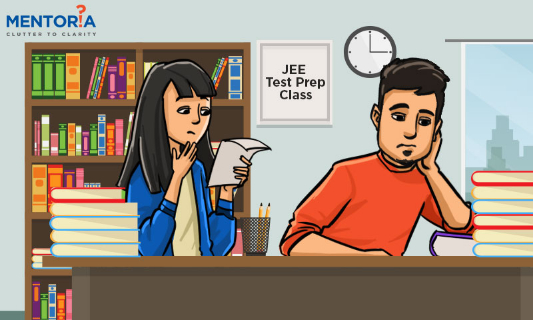All You Need to Know About JEE Exams: Eligibility & Good Score

If you’re thinking about getting into engineering, are looking for information, or wondering if it’s even meant for you, you have landed on the right page. In this three-part series, we explore three important phases that will help you make an informed decision. In this first part, we will cover the first step towards becoming an engineer – prepping for JEE.
Looking for more valuable information on careers? Check out Mentoria’s Knowledge Gateway! We’ve got a whole career library with tips and advice on a number of careers across different fields as well as webinars from industry professionals. Sign up to Mentoria and get lifetime access to the Knowledge Gateway! Discover more here:
Let’s Begin with JEE
Engineering is a popular, “society approved” path to pursue after Class 12, which makes the following statistic pretty believable. According to the results of JEE Mains 2016, around 12 lakh aspirants appeared for JEE Main, out of which around 2 lakh students qualified (source: India Today, April 2016). Now, don’t get us wrong. If your passion for engineering is strong, we will help you achieve your goal. We will also guide you with facts you must know before you set your heart on something.

Do You Really Want to be an Engineer?
What made you choose engineering? Was it your parents? Relatives? An older cousin, perhaps? Did you choose it because your friends were going with it? Is it because you scored good marks?
Or is it because you’re truly interested in engineering as a field, and wish to learn more about it? Engineering is a tedious course that requires a lot of hard work and dedication. Unless you have a keen interest in the field, it will be difficult to cope up with the pressures of the course. If you’re confused, take an in-depth psychometric test to understand where your interests truly lie. We’d be happy to help you figure them out!
We at Mentoria pride ourselves on our emphasis on interest as a factor for choosing a career path. That’s why Mentoria’s holistic psychometric assessment test combines your interests, personality and skills to help you find the ideal career for you!
JEE Main and JEE Advanced
The IIT JEE is a national level engineering admission test that is divided into two stages: JEE Main and JEE Advanced. JEE Main is a screening test that determines who will be qualified to take JEE Advanced, which is the ultimate exam used to choose applicants for admission to reputed IITs. The IITs hold a Joint Entrance Examination (JEE) every year to choose applicants for the 4-year B.Tech, B.Pharm, 5-year B.Arch, Integrated M.Sc., and M.Tech programmes.
JEE Main consists of two multiple-choice papers – Paper 1 and Paper 2. Paper 1 is taken by students who wish to pursue B.E. and B.Tech., while Paper 2 is attempted by students who wish to pursue B.Arch. and B. Planning. You can take Paper 1 online as well as offline, while Paper 2 has to be taken offline. And yes, there’s a negative marking for every wrong answer!
If you qualify for JEE Main, you can take JEE Advanced. This exam is specifically for those who wish to get enrolled in institutes like IIT. This exam has a higher difficulty level and is known to be unpredictable with its pattern. It usually has two papers with three sections each on physics, maths and chemistry, and contains a mix of multiple-choice questions, single answer questions and numerical answer questions. Students who clear this exam then proceed to a round of counselling before actually making it to the IITs.

Eligibility for JEE
IIT JEE Mains
- General category candidates must have secured at least 75% marks in Std. XII board exam (with Mathematics, Physics as the compulsory subjects along with Chemistry / Biology or Biotechnology) or any of the equivalent qualifying exams. (65% for SC-ST category candidates) OR
- Candidates must be in the top 20 percentile of respective Std. XII board.
- There is no age limit to appear for JEE Main
- Candidates are eligible to appear for JEE Main in three consecutive years, from the year he appears for Std. XII. (12th Class) One attempt includes the January and April attempts of the same year.
IIT JEE Advanced
Candidates who crack JEE Main, satisfying all eligibility criteria can appear for JEE Advanced. Admission into various undergraduate programs across IITs is through JEE Advanced.
- Candidates should be in the top 2,50,000 candidates (including reserve category) clearing JEE Main – Paper 1.
- General category candidates must have secured at least 75% marks in Std. XII board exam (with Mathematics, Physics as the compulsory subjects along with Chemistry / Biology or Biotechnology) or any of the equivalent qualifying exams. (65% for SC-ST category candidates) OR
- Candidates must be in the top 20 percentile of respective Std. XII (12th Class) board.
- Candidates are eligible to appear for JEE Advanced in two consecutive years, from the year he appears for Std. XII (12th Class).
- Candidates who join any of the IITs, IT-BHU, Varanasi, and ISM, Dhanbad through JEE will not be permitted to appear for JEE in future
When does JEE Main Happen?
While Joint Entrance Exams or JEE were held around April every year, just recently, HRD minister Prakash Javadekar announced that in 2019, the exam will be held twice – January and April. He also tweeted that, “The best score will be taken into account for the result.”
Ready, Set, Study!
On average, students begin preparing for JEE two years before the test. However, while you may study for years, there is no guarantee that you will pass easily in one attempt. It all depends on your interest in the field and your ability to study for it. There have been students who have sailed their way to the IITs with just a year of preparation, while some have struggled for a decent score for years. If your concepts from school and college are clear, love for engineering is in place, and you prepare with absolute dedication, it is easy to crack JEE with good scores.
Addressing a question about what goes into preparing for JEE, IIT (Mumbai) graduate and an avid Quora contributor Aman Goel says that he spent “an average 8–10 hours of studies a day, peak 14 hours a day, minimum 10 hours a day, no family functions during JEE preparation, no movies, no hangouts with friends.”

But what does “good scores” mean?
If you go by the current standards, most IIT-college admissions close under the rank of 2000. After 2000, you no longer qualify for JEE Advanced and will be expected to look for other colleges.
And what happens if the scores are not “good”?
Ranks around 8000 and upwards are not of great use, unfortunately, and do not leave many options open for you. While you do have an option of looking for colleges that accept average ranks or scores, you can think of changing your choice of stream, college or retake JEE next year. You could also try other entrance tests like NIT, IIIT, and CFTI. Engineering student Mahesh Garkoti says, “If you effectively put 8–10 hours every day honestly for one year, I believe you will be able to get a decent rank, say ~1000. On the other hand, a student who just thinks of preparation as a liability and does not put in enough effort is going to fail. It’s not a fact, it’s the bitter truth.”

What Happens After JEE?
After the results, you can register online for counselling and seat allotment sessions. Be very careful before locking in your choices and do it before the deadline. Candidates are allotted seats based on their All India Ranking (AIR).
With over 10000 recognised institutions across India, you may get a seat. But depending on your score, you may have to compromise…a lot. While having a good career is important, there is inhumane stress attached to JEE, for both students and parents. Today we live in a beautiful millennium where there are hundreds of job options for everyone. Make sure you’re heading down the right path; this will only help you be happy in your future job.
We at Mentoria know that the career journey is anything but straightforward. That’s why we offer career counselling at any point during your career. Our 4-step career guidance solution, helps us find the right career fit for you from 3 streams, 850+ courses & 12,000+ careers.






